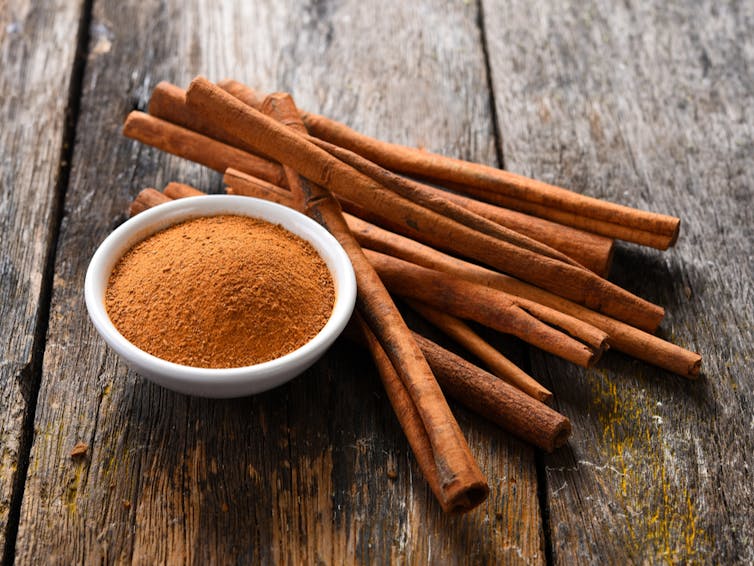A Christmas spice that may help reduce your blood cholesterol

Cinnamon is a popular spice at Christmas time, used to flavour everything from mulled wine to pumpkin pie. And, unlike many Christmas foods, this one might actually be good for you.
Cinnamon, the bark of a small evergreen tree, has been used as a medicine for centuries, if not millennia. It is widely used in traditional Chinese medicine for treating, among other things, acute traumatic pain and “weak digestion”. In Ayurvedic medicine it is used to treat arthritis, diarrhoea and menstrual irregularities.
In Western medicine, it has been known for decades that cinnamon contains biologically active substances (polyphenals) that act in a similar manner to insulin. As a result, it has been proposed that the spice might be beneficial for diabetics. However, a systematic review of the evidence, published in Diabetes Care in 2008, didn’t support using cinnamon for glucose control in patients with type 1 or type 2 diabetes.
Effect on blood cholesterol
Recent studies, though, suggest that cinnamon might be useful in lowering blood cholesterol levels. Raised cholesterol is a huge public health problem as it increases the risks of heart disease and stroke. The World Health Organisation estimates that 2.6m deaths – 4.5% of all deaths, worldwide – are related to high cholesterol.
A recent review of 13 randomised controlled trials investigated whether there was a link between cinnamon supplementation and blood lipid concentrations. There were 750 participants in total – most of them were diabetic. They each took one to six grams of cinnamon powder daily, up to four months.
The authors of the review found that cinnamon supplementation significantly reduced blood triglycerides and total cholesterol levels, but it had no effect on levels of low-density lipoprotein (LDL) cholesterol and high-density lipoprotein (HDL) cholesterol levels, separately. However, when one of the studies was removed in a “sensitivity analysis”, cinnamon supplementation was found to be significantly associated with an elevation in HDL cholesterol, so-called good cholesterol.
Another recent study compared supplementation with cinnamon versus a placebo (a capsule containing flour) on 116 Asian Indians with metabolic syndrome. The researchers found that those in the experimental group (the ones who received three grams of cinnamon for 16 weeks) had significant reductions in total cholesterol, LDL cholesterol and triglycerides, compared with the control group (placebo). The experimental group also showed a significant increase in HDL (good) cholesterol.
So, in summary, the best available evidence shows that cinnamon may be able to reduce blood lipids in people with diabetes or metabolic syndrome. Unfortunately, there isn’t enough data to demonstrate benefits in non-diabetic people, specifically those with high cholesterol.
But is it safe?
Cinnamon is considered safe for most people, when used in small amounts. However, the spice contains a compound, called coumarin, that can cause or worsen liver disease. (Coumarin is also chemically related to the blood-thinning drug, warfarin.)
Of the two common types of cinnamon: cassia cinnamon (Indonesian, Vietnamese, Chinese) and so-called true cinnamon (Ceylon cinnamon), true cinnamon has much lower levels of coumarin (0.04%) compared with cassia cinnamon (4-8%).

The European Food Safety Authority’s recommended tolerable daily intake of coumarin is 0.1 mg per kilogram of body weight. However, no long-term experimental studies have established the safety of cinnamon supplementation, nor of taking cinnamon with statins.
![]() If you want to lower your total or LDL cholesterol levels, there are known effective, safe ways of doing so. These include losing weight, being physically active and eating a balanced, varied diet that is low in saturated and trans fats.
If you want to lower your total or LDL cholesterol levels, there are known effective, safe ways of doing so. These include losing weight, being physically active and eating a balanced, varied diet that is low in saturated and trans fats.
Preethy D'Souza, Research Associate, Social Science Research Unit (SSRU), Department of Social Science (DSS), UCL Institute of Education, UCL
This article was originally published on The Conversation. Read the original article.



